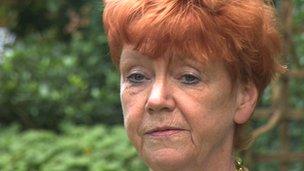Miners' strike policing: Labour calls for Orgreave inquiry
- Published
Police officers involved in clashes with picketing miners at Orgreave were allegedly told what to write in their statements
Labour are calling for an inquiry into claims that South Yorkshire Police manipulated evidence during the miners' strike in 1984.
A BBC Inside Out programme claimed that officers were told what to write in their statements, following clashes at the Orgreave coke works.
The shadow home secretary Yvette Cooper told the Commons the issue needed to be investigated.
South Yorkshire Police said it would consider whether a review was needed.
Speaking in a House of Commons debate on the Hillsborough inquiry, Ms Cooper said: People will have seen, and other honourable members raised, the separate allegations that have emerged this morning about statements being changed over Orgreave, where I think a separate investigation will be needed into what happened."
'Brought to account'
In September, the Hillsborough Independent Panel revealed that 164 South Yorkshire Police statements had been altered after the disaster in April 1989 in which 96 Liverpool fans died.
On 18 June 1984, British Steel's coking plant at Orgreave was the scene for clashes between about 10,000 striking miners from pits across the country and about 5,000 police officers.
The pickets were attempting to stop coke produced at the plant being transported by lorry to the British Steel mill in Scunthorpe.
By the end of that day, 93 pickets had been arrested. Fifty one pickets and 72 police officers were injured, according to the official South Yorkshire Police report.
In the Inside Out programme, broadcast at 19:30 BST on BBC One, Vera Baird, Solicitor General during the last Labour government, said police officers at Orgreave were asked by South Yorkshire Police detectives to describe in their statements "scenes they'd simply never seen".
A barrister at the time, Ms Baird first heard the claims during a trial at Sheffield Crown Court in 1985 while she was defending 15 of the 93 pickets arrested at Orgreave.
The trial collapsed after 16 weeks when it became clear police evidence was unreliable. One officer admitted much of his statement had been narrated to him.
"You can see in a way that they were merely trying to set the scenario, but actually what they were doing was 'teeing up', perverting the course of justice," said Ms Baird.
A South Yorkshire Police spokesman told the BBC the force was "not aware of any adverse comments about statements made during the trial".
"If concerns existed then normal practice would have been for the judge to raise them at the time," he said.
'Widespread collusion'
About 100 statements by police officers who were at Orgreave, which have been obtained by the BBC, have been examined by Sheffield barrister Mark George QC.
The documents revealed "several dozen" examples of officers using exactly the same phrases, signifying "widespread collusion", said Mr George.

Former Solicitor General Vera Baird QC said officers were told what to say in their statements
"You can't get statements in the way they have been done here - by police officers from different forces involved in different arrests - and find such a degree of similarity between those statements without there being some degree of collusion."
The "clear plan" by senior officers was to make the charges faced by pickets as serious as possible, said Ms Baird.
While pickets found guilty of a public order offence would most likely have to pay a fine, those who faced the more serious charge of riot could be jailed for life.
Norman Taylor, a detective with the Northumbria force who was on duty at Orgreave, said he was told by a plain clothes policeman what to write as part of his witness statement.
"He was reading from some paper, a paragraph or so, and he asked people to use that as their starting paragraph," said Mr Taylor.
However, Bob Bird, a former officer from the West Midlands force who was also on duty at Orgreave that day, told the BBC he was "not dictated to".
Mr Mann said all these claims should be properly examined as "the reputation of police in South Yorkshire needs to be protected".
- Published13 September 2012
- Published16 October 2012
- Published12 October 2012